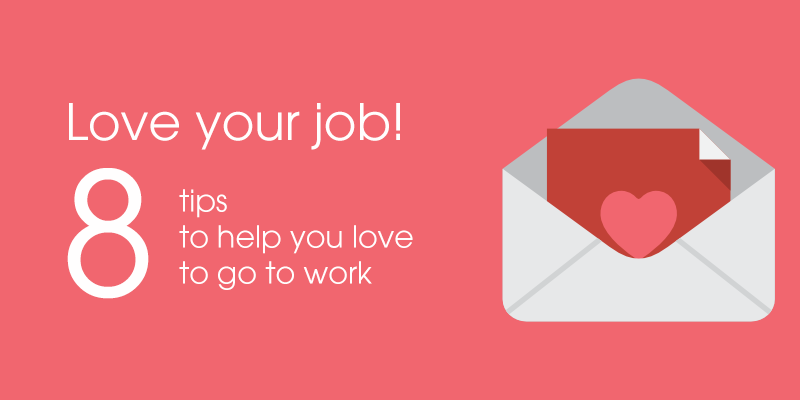about 6 years ago

Whatever the reason why you accepted your current job, if you are not enjoying it as much as you hoped you would do so, there is always a way to make things better. Whether you join your team because you needed a job at the time; or you felt it was love at first sight but turned out to not be, it is possible to revive your relationship with your job. Reading on this article now is the first step.
First, it is all about your state of mind.
You can and should find enjoyment in your work. Doing so is very valuable to your life in many ways, including significantly increasing your probability of professional and financial success. However, you don’t have to love, or even like your overall job to enjoy everyday aspects of it.
Passionate about the job…no. Passionate about how well you do the job…yes.
So if your boss doesn’t appreciate you, you’re underpaid, your company isn’t ideal…that can be OK, for now. They aren’t the key evaluators in your life. You are. Do your job well for you and for the experience and future perspective you can get from it.
Even if you don’t like your specific work, or the work environment you are in, you can love the way you do it.
Also, you may discover, as you focus on doing it better, that some of the irritant parts of your job become more rewarding, or at least less miserable.
Afraid of being stuck in the same job for life? Don’t worry.
Individuals who emphasise the positive and rewarding aspects of their job, don’t stay in unpleasant situations that long. They get promoted or use their positive record to get a more fulfilling job.
So, paraphrasing a Stephen Stills' verse:
"If you can’t be in the job you love… Love the job you’re in"
Having this winning spirit will make every job much more enjoyable and rewarding.
At work, we all want to be involved, rewarded, have an enjoyable time and get recognition or promotion for our efforts. We all want to be appreciated for the work we do.
But at the same time, we want a balanced life with time for the things we want to do with a full and exciting social life. Of course, we want to have clarity about our career, job duties and we want to continue to be healthy, fit and stress-free.
It sounds like the best way would be to enjoy the way you are doing your present job, even if you are looking for new opportunities, and keep celebrating and expanding all the other joys of life that surround you.
To help you enjoy your work-life as much as your out of work life, here are a few things we put together:
1. Set up some goals to get motivated to face the day
Work can feel not enjoyable if you think you have nothing to strive for. Work with your supervisor to set reasonable but inspiring goals that will motivate you and help provide structure and focus for each day. Achieving these targets can also help create leverage for you to negotiate a promotion or give the opportunity to switch teams, departments, or roles down the road.
2. Be clear about what’s expected from you
If you feel you are not sure you are doing your task right, clarify immediately. There is nothing worth than feeling lost in what we do.
Plus, when you know what you have to do and how to do it, you will do it way better which will be beneficial for you and your team in the long term.
3. Make a list of things you want to improve
Take some time to clearly define what aspects of your current work situation you would like to improve.
For example, you might talk to your supervisor about potentially moving your desk space or getting approval to work from home one day per week, or you might decide to find a “meeting buddy” who can help make space for you to talk.
4. Expand your network
Being in contact with people having a similar position can help you to be more creative in the way you deal with your daily task.
You might also be currently dealing with some work issue some people have been through before you. Sharing experience is always a good thing to do.
On the plus side, talking about your achievement could connect you with better opportunities or future co-workers.
5. Think of the plus-side of your job
Write down all the little and big things you’re grateful for, from the coffee shop you stop at on your way into the office to the fact that your job helps you support your family. Studies have shown that listing everything you’re grateful for can help you feel more optimistic about your current circumstances.
Plus, think of how the work you have allows you to have your life outside of it, such as a great social life. A positive attitude will make the day more pleasant and productive.
Maybe your position allows you health insurance that covers self-care practices like massage or acupuncture, or you have a particular budget to treat yourself to a new monitor, or your company offers complimentary gym memberships for its employees. There might even be benefits that you aren’t aware of.
So maybe you don’t love your job, but there are probably perks that are easy to enjoy!
6. Create an aesthetical atmosphere
Give your workspace a make-over: Print and hang inspiring quotes or some photos of places or people you love. Get that lovely mug or buy a new planner that makes you smile, light an uplifting candle or add a desk flower. By personalising your workspace, you’ll feel better about coming into work every day.
7. Learn to switch off
No matter how challenging the work gets, at the end of the day it is only a job, and you deserve some time off.
You are already at work a third of your time, so do not continue to keep it buzzing in your head during your supposed free time. Mentally say goodbye to your workspace the moment you leave for home.
8. Get back in time and think about why you accepted the job
Think back to the initial job offer and why you took it. Perhaps you’re making good money, or you’re working for a good cause, or your schedule is flexible, or the benefits are great. Even if things have changed since then, keeping in mind why you accepted the job offer (and what’s important to you now) could help you navigate your next steps, whether that’s taking action to improve your job or preparing a plan to find a new one.
See your work as a game. Life is meant to be fun, and if you are going to spend a third of it at work, you might as well enjoy the game.

